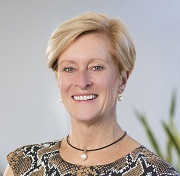Vanessa Guthrie
Dr Vanessa Guthrie is an experienced executive and director and has been included on the list of the world’s Top 100 inspirational women in mining. Vanessa holds qualifications from UNE including a Bachelor of Science (Hons) and a Graduate Diploma in Natural Resources. Dr Guthrie serves on several boards including the Australian Broadcasting Corporation, Curtin University where she is Pro Chancellor and the WACA where she is Deputy Chair.
 What are your UNE qualifications?
What are your UNE qualifications?
- Bachelor of Science with Honours in geology
- Diploma in Natural Resources
Online or on-campus study?
Campus – there was no such thing as on-line study when I was at UNE!!!
How did you find UNE lecturers?
During the 1980s, UNE was recognised as one of the pre-eminent geology departments across the globe. I was blessed to have been able to study under such luminaries as Professor Dick Stanton, Professor Bruce Runnegar and Professor John Wilkinson, who were recognised as first among equals by their peers in the academic community, as well as other well recognised professors such as Barrie McKelvey, Peter Flood, Ian Plimer and Nick Stephenson.
What was your reason for studying at UNE?
I wanted to study environmental science when I left school, and UNE was one of the few universities in Australia at that time to offer a ‘pure’ environmental science course in the Bachelor of Natural Resources.
The other attraction of UNE was its location in Armidale in country NSW. I was keen to leave Sydney (where I grew up) and explore life in a country town – and it also let me leave home into the relatively safe environment of UNE residential colleges!
How has your UNE qualification aided you in your career?
My Science degree in geology and Diploma in Natural Resources gave me a unique stepping off point for my early career in geology, which led to me studying for a doctorate degree in geology in Tasmania.
Combined with my Diploma in Natural Resources, this positioned me well to gain my first full-time role in the mining industry as an environmental scientist, and led to a life-long passion for working in the mining industry across Australia. I have been very fortunate to live and work in many parts of Australia, including Tasmania, NSW and Western Australia, as well as globally in France, Germany, UK and now on the board of a global mining company.
The principles of science that I first learned at UNE – looking for facts and being observant of trends, and analysing data to make decisions – have stayed with me throughout my career, and remain the basis of how I approach questions in my current roles as a Non-Executive Director on a number of boards across Australia.
What inspires you inside work and outside work?
My family. I met my husband at UNE – who also studied geology – and we have two wonderful sons.
I have been inspired throughout my career to make a difference to the companies I work with by challenging thinking, looking for better ways to do things and helping people be the best they can be. All companies are dependent on their people, so that is the starting point for creating value from the assets they own.
Do you volunteer your time for a community project or organisation?
Throughout my life I have volunteered in a number of ways to give back to the community, including in schools and sports clubs. At the moment, I volunteer my time on a couple of boards (including the WA Cricket Association) as well as mentoring executives in not-for-profits and businesses. I find volunteering a rewarding way to give back to others, and often find I learn even more from those I mentor than I might have expected!
In this time of Covid-19, how has the virus impacted your work?
I am working from home instead of being able to attend board meetings in person. The main impact has been on stopping me from travelling to the East Coast to attend boards, and I seem to have become an expert in the many video conferencing apps that are now available!
Of course, every board I work with has had to activate our crisis management plans, as well as implement business continuity plans as we move into a recovery phase. The impact of COVID-19 will be felt across our economy for some time to come, and it will certainly change how we do business in the future – the key is to make sure that those changes are for the better!

